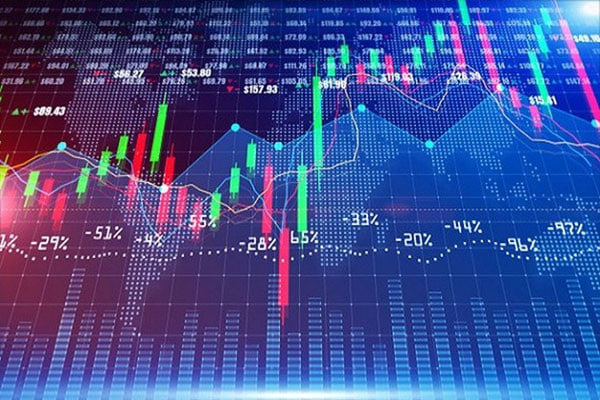Navigating the Choppy Waters of Global Trade: How Geopolitical Tensions Impact Securities Markets
Meta Description: Global trade tensions, US-China trade war, WTO rules, securities market impact, geopolitical risk, economic sanctions, China's response to trade restrictions, international trade disputes, supply chain disruptions.
Dive into the heart of the matter: Imagine this: you're an investor, carefully watching your portfolio, suddenly feeling the tremors of a global trade war. The headlines scream about new sanctions, tariffs soar, and supply chains creak under the strain. Sounds stressful, right? It is. But understanding the intricate dance between global politics and the securities market isn't just about bracing for impact; it's about strategically navigating this increasingly complex landscape. This in-depth analysis delves into the seismic shifts caused by recent trade restrictions, particularly those impacting China, offering insights that go beyond the surface-level news reports. We'll unpack the implications for investors, businesses, and the global economy, providing actionable knowledge you can use to make informed decisions. This isn't just another news recap; it’s a comprehensive guide to understanding, anticipating, and even profiting from the volatile world of international trade. Get ready to sharpen your investment acumen and build a more resilient portfolio in these turbulent times. We'll explore real-world examples, dissect expert opinions, and equip you with the tools to not just survive, but thrive in this era of heightened geopolitical uncertainty. Whether you're a seasoned investor or just starting out, this analysis will give you a competitive edge in understanding the interconnectedness of global politics and your investments. Let's get started!
Understanding the Impact of Trade Restrictions on Securities Markets
Recent actions by the US and EU, imposing restrictions on trade with China, have sent shockwaves through global securities markets. These unilateral measures, blatantly disregarding WTO rules, are causing significant disruption. The resulting uncertainty is a major factor influencing investor sentiment and market volatility. This isn't just about tariffs; it's about the erosion of trust in the stability of global trade relationships. The ripple effect is felt across various sectors, particularly those heavily reliant on international supply chains. Think tech, manufacturing, and even agriculture – all vulnerable to these trade skirmishes.
How does it work? Let's break it down:
- Increased Uncertainty: The unpredictability of government policy creates a climate of fear, leading investors to adopt a wait-and-see approach, potentially reducing investment and slowing economic growth.
- Supply Chain Disruptions: Restrictions on trade directly impact the flow of goods, causing shortages, price increases, and disruptions to production schedules. Companies reliant on global supply chains are particularly vulnerable. This also leads to higher input costs, squeezing profit margins.
- Currency Fluctuations: Trade wars often lead to currency volatility as investors react to shifts in economic outlook and international trade flows. This can impact the value of investments held in different currencies.
- Tariff Wars: Tariffs are essentially taxes on imported goods, increasing the cost of products for consumers and businesses. This can lead to inflation and reduced consumer spending. Essentially, it's a tax on everyone involved.
Real-world Examples: The impact of these restrictions is already evident in several sectors. For instance, the semiconductor industry has faced significant challenges due to restrictions on the export of advanced chips to China. This has led to a surge in prices and shortages, affecting various downstream industries. Similarly, the automotive industry has been affected by disruptions in the supply of key components.
China's Response and the Fight for Fair Trade
China, naturally, hasn't taken these restrictions lying down. Their response has been multifaceted, encompassing diplomatic efforts, retaliatory measures, and a renewed focus on domestic supply chain resilience. This includes:
- WTO Challenges: China has actively challenged these restrictions through the World Trade Organization (WTO), arguing that they violate international trade rules. This legal battle is likely to be protracted and complex.
- Retaliatory Measures: In response to US and EU actions, China has implemented its own trade restrictions, creating a tit-for-tat scenario that further exacerbates global trade tensions.
- Emphasis on Domestic Production: China is accelerating efforts to reduce its reliance on foreign technologies and strengthen its domestic production capabilities. This is a strategic move to mitigate the impact of future trade restrictions. It's a long-term game, folks.
The battle for fair trade is far from over. Both sides are digging in, and the outcome remains uncertain. However, one thing is clear: this conflict has profound implications for global economic stability and the securities market.
Navigating the Geopolitical Landscape: Strategies for Investors
So, what can investors do in this tumultuous environment? Here's a multi-pronged approach:
- Diversification: Diversifying your investment portfolio across different asset classes and geographies is crucial to mitigate the risks associated with trade wars. Don't put all your eggs in one basket!
- Due Diligence: Thorough research is paramount. Understand the companies you invest in and their exposure to global trade. Look for companies with diversified supply chains and robust risk management strategies.
- Long-Term Perspective: Avoid knee-jerk reactions. Trade tensions are likely to persist, but market fluctuations are often temporary. A long-term investment strategy is key to weathering these storms.
- Stay Informed: Keep abreast of developments in global trade policy and their impact on specific sectors. Reliable news sources and economic analysis can help you make informed decisions.
Remember: this isn't about predicting the future; it's about managing risk and positioning yourself for success in an uncertain world.
Frequently Asked Questions (FAQs)
Q1: How long will these trade tensions last?
A1: Predicting the duration of trade tensions is difficult. It depends on the actions and reactions of various governments and the evolution of geopolitical dynamics. It could be months, years, or even longer, making a long-term investment strategy even more crucial.
Q2: Which sectors are most vulnerable to trade restrictions?
A2: Sectors heavily reliant on international supply chains, such as technology, manufacturing, and automobiles, are particularly vulnerable. However, the impact can ripple through the entire economy.
Q3: Can I profit from this uncertainty?
A3: While uncertainty poses risks, it can also create opportunities for savvy investors. Careful analysis of market movements and strategic investments in companies well-positioned to navigate these challenges can lead to profits.
Q4: What role does the WTO play in all this?
A4: The WTO provides a framework for resolving trade disputes. However, its effectiveness is often challenged by unilateral actions taken by powerful nations. China's challenges to the US and EU actions highlight the ongoing debate about the WTO's ability to enforce its rules.
Q5: What is the impact on small businesses?
A5: Small businesses are often disproportionately affected by trade wars, as they have fewer resources to weather economic shocks. Many rely heavily on global supply chains, making them particularly vulnerable to disruptions.
Q6: What about the impact on consumers?
A6: Consumers typically bear the brunt of trade wars in the form of higher prices due to tariffs and supply chain disruptions. Reduced availability of certain goods may also impact consumer choices.
Conclusion: Adapting to a New Era of Global Trade
The current global trade environment is undeniably challenging. However, by understanding the dynamics at play, implementing effective risk management strategies, and maintaining a long-term perspective, investors can navigate these choppy waters and potentially even profit from the uncertainty. The key is to stay informed, remain adaptable, and focus on building a resilient portfolio that can withstand the pressures of geopolitical risk. This requires constant vigilance, rigorous due diligence, and a willingness to adapt to a constantly evolving landscape. The future of global trade remains uncertain, but with careful planning and strategic decision-making, investors can successfully navigate this new era of international relations.



